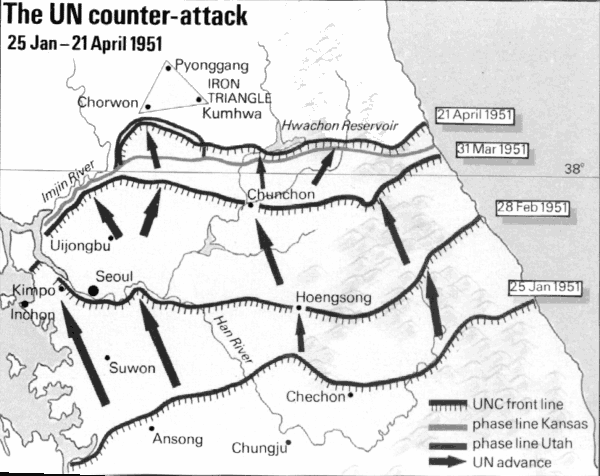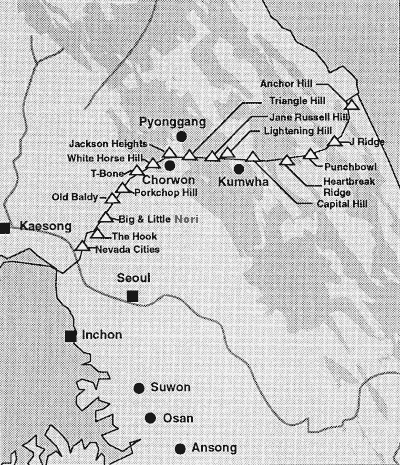North Korea launched its invasion of the South with every confidence that they would win the war in a month or two. They were well armed by the USSR, their ranks filled with battle-hardened veterans of China's Civil War, and the Truman administration had deliberately withheld effective weapons from the Republic of Korea, believing that nuclear weapons had made large scale infantry warfare obsolete. As the ROKs were essentially helpless in the face of the North's coordinated air, armor and infantry onslaught, the NK did initially run amok, capturing or destroying everything they attacked, and murdering thousands of "political' enemies. They seemed unstopable, and total NK victory assured.
But ... things changed. The UN, mainly supported by the United States, managed to put enough troops into the Pusan Peninsula to delay the NK drive, with overwhelming air supremacy which delayed it still more. And then MacArthur and a few Marines made their brilliant end run around the NK troops, to invade Inchon. When X Corps landed far behind the North Korean lines on September 15, 1950, within two weeks the North Korean army (NK) was largely made ineffective. The way to the Yalu, and total destruction of North Korea's military power, seemed virtually unopposed. Intoxicated with apparent victory, Truman and the UN authorized crossing the 38th parallel and Eighth Army stormed toward the Yalu ... intending to get "Home by Christmas."
But again, things changed. With hundreds of thousands of tough, veteran foot Infantry, China struck. Totally crushing Eighth Army in the west, China also drove our great First Marine Division out of the Taebeck mountains back to Hungnam, and forced evacuation of X Corps. Now it was China's turn to be seduced by the tantalizing prospect of total victory, over the best the entire United Nations could bring against them. Given China's history of oppression by foreign powers and her desperate need to finally be recognized as a great member of world nations, the temptation was impossible to resist. In her turn, China drove across the 38th parallel, pursuing the shattered Eighth Army and again capturing Seoul
But, the tide turned yet again. Eighth Army used the time the CCF had spent chasing them past the Han to re-group. With a new Commanding General, the UN forces began a determined counter-attack which again re-crossed the Han, re-captured Seoul, and again reached the 38th Parallel, tentatively preparing a defendable line.

But ... things changed yet again. The CCF launched its Fifth phase offensive, forcing Eighth Army to retreat yet again, threatening encirclement of our forces yet again, and threatening to capture Seoul yet again.
But ... things changed still again. In May, 12 full-strength Chinese divisions, supported by 40,000 North Korean troops, attempted to destroy the US Second Infantry Division in an assault on the scale of Chosin. 2nd ID was well dug in, behind fields of mines and barbed wire, and held fast although the hard-hit ROKs fell back and exposed 2id's right flank. They were strongly supported by the French and Dutch Battalions, their tank battalions, five battalions of massed artillery, B-26 bombers, their right flank was re-occupied by the the 3rd Division, and the 1st Marines protected their left flank, enabling full use of their 9th Infantry Regiment. The result is known as the May Massacre. Shocked by such heavy losses the CCF now fled from our troops just as we had so often fled from theirs as Eighth Army drove the CCF and NK forces back across the 38th parallel once again. This time, the UN halted significant offensive operations and began the construction of a trench line the width of Korea. After their last bloodbath, the CCF seemed to rethink their situation, entered into truce negotiations and began digging in their own trench lines.
The opposing lines were both defensive, mostly north of the 38th parallel, and the war settled into disjoint, vicious battles around a relatively stable Main Line of Resistance while truce talks began and slowly ground their way to agreement over the next two years. China, the USSR and the UN all took care to limit their reactions. We declined to use Chinese Nationalist forces, and China declined to menace Taiwan with invasion, and our staging base of Japan was never threatened. The escalation to a general global conflict never occurred. Whether this was really a possibility, or whether it was ultimately better not to have forced the issue in any case, may never be known for certain.
In the event, the fighting reduced to bitter, small scale actions, mostly around Combat Outposts (COPs). About half the total casualties of the Korean War occurred in this wasted, futile, terrible two year period. To illustrate the futile savagery, during the truce talks from March 1952 to July 1953 more than thirteen thousand Marines were killed, wounded or captured. The time is sometimes known as the Outpost War, since most of its major battles were fought over outposts in front of the main lines.
UN forces were not permitted to advance or capture any significant new territory. The MLR was to be held at all costs, but the actual fighting generally took place around OPs, ranging up to 5,000 yards in front of the MLR the width of Korea. These OPs commanded high ground from which we could observe, control and raid the enemy, or which covered ground over which the enemy could pass to assault our own OPs and the MLR itself. These OPs ranged from squad to company size, some were constantly manned, and others manned only either day or night.
These OPs were fought over, gained or lost, regained or relost, for well over a year. Always, at the cost of lives and worse.


